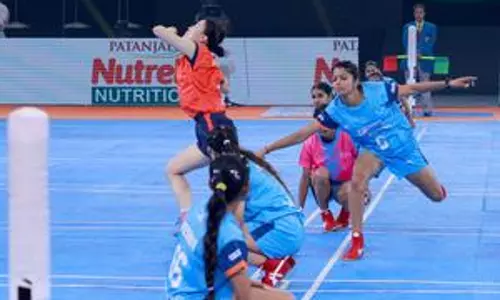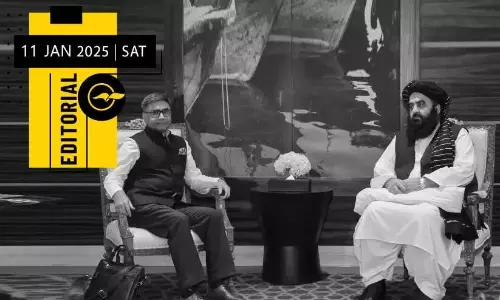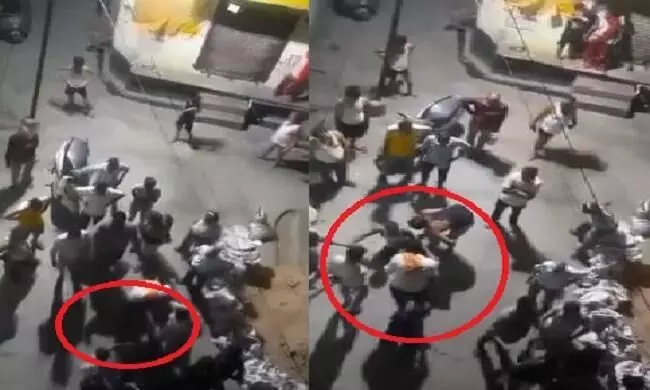
FIR against kin of lynched Muslim man in UP: HC protects from coercive action
text_fieldsIn the FIR filed against the brother of a Muslim man who was lynched by a Hindu mob after being accused of dacoity and assaulting a Hindu woman in Aligarh, Uttar Pradesh, in June 2023, the Allahabad High Court granted protection from any coercive action to the deceased man's brother, who was also implicated in the case.
The Allahabad High Court has intervened to shield Zaki from the FIR, which was lodged 11 days after the mob lynching by Laxmi Rani Mittal, a Hindu woman in whose house the alleged theft was attempted and whose husband was also involved in the killing of Aurangzeb, The Wire reported.
On June 18, 35-year-old Aurangzeb was allegedly beaten to death by a group of local Hindu men in Aligarh. The mob accused him of attempting to steal from a Hindu trader’s house. Days after his death, a First Information Report (FIR) was lodged on June 29, naming Aurangzeb, Zaki, and five others in connection with a dacoity and assault that allegedly took place in the house where Aurangzeb was lynched.
Laxmi Rani Mittal claimed that the accused had committed a robbery in her house on the same night Aurangzeb was killed.
Mittal's FIR included severe charges under the Indian Penal Code, including Sections 354, for assault or use of criminal force against a woman, and 395, for dacoity. However, the fact that the FIR was filed 11 days after Aurangzeb’s death and named him as an accused triggered widespread condemnation.
The delay in filing and the inclusion of a deceased person in the list of accused raised concerns about the intentions behind the FIR. Critics, including local opposition groups, questioned the role of the police and the involvement of the ruling BJP, as a local MLA, Mukta Raja, publicly supported the Hindu men accused of killing Aurangzeb.
Zaki, in his defence, filed a petition challenging the FIR. His legal team argued that the FIR was lodged with malicious intent as retaliation for a separate complaint he had made regarding his brother’s lynching.
Zaki’s petition pointed out that Aurangzeb had died on the night of June 18, with his post-mortem conducted the next day. Despite these clear facts, his name was included in Mittal’s complaint. Moreover, the petition highlighted that Mittal’s husband, who had been arrested in connection with Aurangzeb’s murder, was not mentioned in her FIR, even though Mittal claimed her husband had been at home during the incident.
The High Court’s decision to protect Zaki from arrest until the chargesheet is filed or the case progresses further provides some temporary relief. However, the court stipulated that Zaki must cooperate fully with the investigation. While granting this interim relief, the bench noted the need for a thorough investigation into the FIR and directed that police authorities be notified to submit their response.
Mittal’s version of events, outlined in her FIR, presented a different narrative from Zaki’s complaint and the viral video that emerged shortly after Aurangzeb’s death. According to Mittal, a group of five or six men, including Aurangzeb, entered her house with the intention of robbing her. She described how the men held her at gunpoint, stole valuables, and attempted to flee the scene.
Mittal claimed that Aurangzeb was injured while trying to escape and was later apprehended by local residents. She alleged that Aurangzeb confessed to being part of a larger group planning a robbery.
On the other hand, Zaki’s complaint, filed immediately after his brother’s death, described Aurangzeb as the victim of a targeted mob attack. Zaki stated that his brother was returning home after work when he was confronted by a group of local men who identified him as Muslim.
The attackers allegedly beat him with sticks and kicks, leading to his death. The lynching, Zaki argued, was a result of communal hatred, and the video footage circulating online appeared to support his version of events.
The FIR lodged on Zaki’s behalf named ten Hindu men, including individuals involved in the assault on Aurangzeb. Despite these serious charges, Mittal’s complaint directly contradicted the narrative of a mob lynching, alleging that Aurangzeb was caught in the act of committing a robbery and sustained injuries in his attempt to flee.























